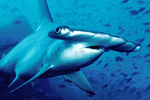
Blue shark (Prionace glauca) off southern California. Photo by: Mark Conlin/NMFS.
A recent study published in mongabay.com’s open access journal Tropical Conservation Science raises concerns about levels of heavy metals, particularly lead (Pb), present in shark meat, as well as the decline of shark abundance due to global fishing pressures.
Sharks are primarily caught as by-catch for other fishing industries. By one account, 70% of the total catch in swordfish long-line fisheries was sharks. Due to consumer demand, this by-catch is sold to Asian fish markets as fin and trunk meat. Much of the trunk and organ meat is used to make fish-meal, which is then fed to farmed fish.
Heavy metals and other environmental toxins accumulate in plant and animal tissues through the well-documented process of bioaccumulation. Sharks are prone to bioaccumulation through diet (biomagnification) as they incorporate metals very efficiently and eliminate them slowly. While the World Health Organization (WHO) has set limits for levels of heavy metals permitted in fish meat, in the southeastern Pacific Ocean, these limits are not regulated; so three researchers from Chile decided to investigate shark meat intended for consumption.
For their study, they collected 69 blue sharks (Prionace glauca) and 39 mako short fin sharks (Isurus oxyrinchus) from swordfish fisheries by-catch off the coast of Chile. Dorsal muscles, livers and stomachs were analyzed for lead (Pb) and mercury (Hb) levels.
Lead concentrations in both species exceeded recommended limits, constituting a risk for human health. Metals were more concentrated in organ meats and in the larger-sized sharks. Levels of mercury were lower than the limit; however, as the authors point out, these limits do not take into account the highly-toxic, synergistic effects of mercury and lead when combined in tissues.
Sharks are apex predators whose trophic habits structure marine food webs. The altering of greater marine ecosystems that come with a declining shark populations alongside the considerable health risks posed by eating sharks suggest that perhaps we should leave them alone, at the very top of the food chain.
Lopez, S., Abarca, N., Meléndez, R., Heavy Metal Concentrations of two highly migratory sharks (Prionace glauca and Isurus oxyrinchus)in the southeastern Pacific waters: comments on public health and conservation. Tropical Conservation Science Vol. 6 (1) 126-137, 2013.
Related articles
Sharks and rays win protections at CITES

(03/11/2013) Today, for the first time, sharks and rays have won the vote for better protection under CITES (the Convention on International Trade in Endangered Species), the world’s regulating body on trade in threatened species. Five shark species and manta rays, which includes two species, have received enough votes to be listed under Appendix II of CITES, which means tougher regulations, but not an outright ban. However, the votes could still be overturned before the end of the meeting.
Has shark fin consumption peaked at 100M dead sharks per year?

(03/05/2013) While a new study warns that up to 100M sharks are killed annually, there are signs out of China that demand for shark fin may be on the decline. A study published last week in the journal Marine Policy estimated shark deaths at 100 million in 2000 and 97 million in 2010, suggesting a slight drop in shark killing. Meanwhile reports out of China in recent months suggest an accelerating decline in shark fin consumption. China is the top market for shark fin, which is consumed as a status symbol, typically at wedding ceremonies and business dinners.

(12/04/2012) Sharks are among the most feared of all the world’s predators, yet humans kill tens of millions of sharks for every person who falls victim to shark attack. Part of our fear stems from lack of understanding. A new eBook however tries to change that. Jeff Corwin, an Emmy Award Winning TV host, has this week released Jeff’s Explorer Series: SHARKS, the first of a new eBook series, which Corwin likens to the 21st century version of an encyclopedia. The eBook is rich with video, images, and text. It is narrated by Corwin.